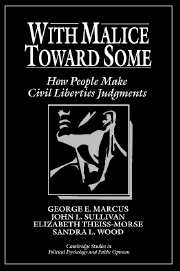Book contents
- Frontmatter
- Contents
- List of Figures and Tables
- Preface: Political Tolerance and Democratic Life
- PART I Theoretical Background and Overview
- PART II Contemporary Information and Political Tolerance Judgments
- PART III Refining the Model – The Role of Antecedent Considerations as Individual Differences
- PART IV Implications and Conclusions
- 9 Intensity, Motivations, and Behavioral Intentions
- 10 Human Nature and Political Tolerance
- Appendix A: Hypothetical Group Scenarios and Manipulations
- Appendix B: Methodological Approaches and Scales
- Notes
- References
- Index
9 - Intensity, Motivations, and Behavioral Intentions
Published online by Cambridge University Press: 05 August 2012
- Frontmatter
- Contents
- List of Figures and Tables
- Preface: Political Tolerance and Democratic Life
- PART I Theoretical Background and Overview
- PART II Contemporary Information and Political Tolerance Judgments
- PART III Refining the Model – The Role of Antecedent Considerations as Individual Differences
- PART IV Implications and Conclusions
- 9 Intensity, Motivations, and Behavioral Intentions
- 10 Human Nature and Political Tolerance
- Appendix A: Hypothetical Group Scenarios and Manipulations
- Appendix B: Methodological Approaches and Scales
- Notes
- References
- Index
Summary
Democratic viability is, to begin with, saved by the fact that those who are most confused about democratic ideas are also likely to be politically apathetic and without significant influence. Their role in the nation's decision process is so small that their “misguided” opinions or non-opinions have little practical consequence for stability. If they contribute little to the vitality of the system, neither are they likely to do much harm.
Herbert McClosky, “Consensus and Ideology in American Politics”Nonprejudiced attitudes, according to Devine (1989), require conscious, controlled processing to override the automatic, nonconscious response of stereotyping. Staub (1989) makes a similar argument that devaluation and scapegoating are also often automatic. Many people respond to outgroups by devaluing their members and using them as scapegoats when they are forced to live under difficult conditions, but others consciously inhibit these automatic responses. The latter have a developed sense of individual responsibility (Staub, 1989) and internalized values (Devine, 1989; Kelman & Hamilton, 1989). They evaluate their psychological reactions in light of their personal goals, values, and beliefs, and often set their instinctive reactions aside. This controlled processing, however, is often difficult.
Political tolerance fits into this genre of attitudes that are difficult to hold: the tolerant find a group to be noxious and its espoused ideas offensive, yet they are willing to give the members of this group freedom of speech and of assembly, and the right to be a vocal part of the democratic political system.
- Type
- Chapter
- Information
- With Malice toward SomeHow People Make Civil Liberties Judgments, pp. 181 - 208Publisher: Cambridge University PressPrint publication year: 1995

